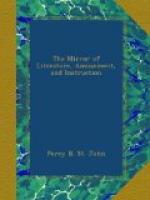“Mr. Kemble was announced. Lady C——k reproached him as ’the late Mr. Kemble;’ and then, looking significantly at me, told him who I was. Kemble, to whom I had been already presented by Mrs. Lefanu, acknowledged me by a kindly nod; but the intense stare which succeeded, was not one of mere recognition. It was the glazed, fixed look, so common to those who have been making libations to altars which rarely qualify them for ladies’ society. Mr. Kemble was evidently much pre-occupied, and a little exalted; and he appeared actuated by some intention, which he had the will, but not the power, to execute. He was seated vis-a-vis, and had repeatedly raised his arm, and stretched it across the table, for the purpose, as I supposed, of helping himself to some boar’s head in jelly. Alas, no!—the bore was, that my head happened to be the object which fixed his tenacious attention; and which being a true Irish cathah head, dark, cropped, and curly, and struck him as a particularly well organized Brutus, and better than any in his repertoire of theatrical perukes. Succeeding at last in his feline and fixed purpose, he actually struck his claws in my locks, and addressing me in the deepest sepulchral tones, asked—“Little girl, where did you buy your wig?”
Lord Erskine “came to the rescue,” and liberated my head.
Lord Carysfort exclaimed, to relieve the awkwardness of the scene, “les serpents de l’envie ont siffles dans son coeur;” on every side—
“Some
did laugh,
And some did say, God bless us,”
—while I, like Macbeth—
“Could not say, Amen.”
Meantime Kemble, peevish, as half-tipsy people generally are, and ill brooking the interference of the two peers, drew back, muttering and fumbling in his coat-pocket, evidently with some dire intent lowering in his eyes. To the amusement of all, and to my increased consternation, he drew forth a volume of the “Wild Irish Girl,” (which he had brought to return to Lady C——k) and, reading, with his deep, emphatic voice, one of the most high-flown of its passages, he paused, and patting the page with his forefinger, with the look of Hamlet addressing Polonius, he said, “Little girl, why did you write such nonsense? And where did you get all these d—d hard words?”
Thus taken by surprise, and “smarting with my wounds” or mortified authorship, I answered, unwittingly and witlessly, the truth: “Sir, I wrote as well as I could, and I got the hard words out of Johnson’s Dictionary.”
The eloquence of Erskine himself would have pleaded my cause with less effect; and the “J’y allois” of La Fontaine was not quoted with more approbation in the circles of Paris, than the naivete of my equally veracious and spontaneous reply. The triumph of my simplicity did not increase Kemble’s good humour; and, shortly after, Mr. Spenser carried him off in his carriage, to prevent any further attacks on my unfortunate head—inside or out.




